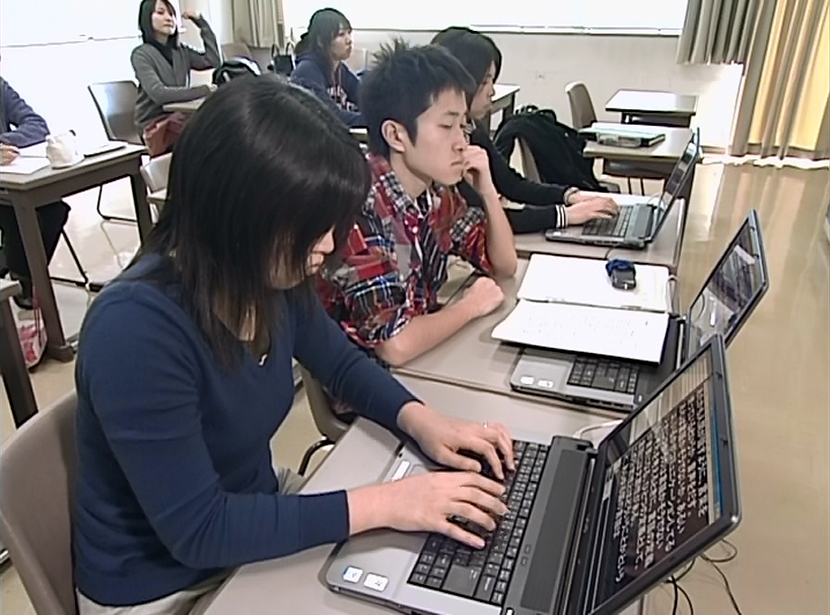Context: The Government of Japan adopted the Convention on the Rights of Persons with Disabilities (CRPD) of the United Nations on 3 December 2013 and more recently in April 2016 enacted the Act on the Elimination of Disability Discrimination. Among a myriad of other issues and topics, these pieces of legislation help to promote the inclusion of youth with disabilities in postsecondary education. Regarding youth who are deaf or hard of hearing, a survey revealed that approximately 34 per cent of universities in Japan accept students who have hearing disabilities. Among these institutions, it was reported that 48 per cent provide note-taking services. As a result, many Japanese youth with hearing disabilities in postsecondary education encounter difficulty in their studies due to the lack of accessibility.
Objective of programme/ initiative: The Postsecondary Education Programmes Network of Japan (PEPNet-Japan) is a unique programme that promotes youth education and employment through the partnership of hearing youth volunteers and students with hearing disabilities in higher education. PEPNet-Japan helps train hearing students how to take notes for deaf and hard of hearing individuals using IPtalk software that allows 2 to 4 hearing students simultaneously take notes during a lecture that are then displayed in real-time on the other student’s computer. Through this cooperative programme, deaf and hard of hearing youth’s access to higher education is improved and the hearing youth volunteers gain valuable employable skills they can use in a future career.
Main challenges: The initial challenge for increasing accessibility in higher education institutes in Japan was the lack of available note-takers or interpreters from agencies. PEPNet was the answer to this issue by increasing the amount of resources available for students with hearing disabilities.
While volunteer note-takers have been very helpful in assisting students with hearing disabilities, they are not trained professionals and at times are only able to convey 20 to 30 per cent of the professor’s original message. PEPNet continues to refine the training of volunteers as well as increase the number of volunteers, since it takes 20 to 30 student volunteers to cover all the classes of one student with hearing disabilities.
Results achieved: Not only does PEPNet provide direct training but the foundation also trains staff and students at universities how to train others to assist students with hearing disabilities. Approximately 2,000-3,000 students are trained annually with some degree of support from PEPNet. Considering the ripple effect of training for trainers, it is estimated that at least 10,000 students are trained annually either directly or indirectly as a result of PEPNet.
The foundation developed more than 50 materials related to supporting hear and hard of hearing students and forged partnerships with 23 universities across Japan. In 2013, the Japanese Government recognized PEPNet’s success by awarding them the Prime Minister Award for Barrier-free Universal Design.
Moving Forward: PEPNet is interested in developing an online e-learning platform that would provide training and practice related to note taking for students with hearing disabilities. The foundation believes such a system could increase the reach of their services and provide convenience to the user. Another feature the foundation hopes to add to their website is a resource sharing system, which would include a searchable database of trained students who could help other universities.
Replicability: Unlike other programmes that target youth with disabilities as the sole recipient, PEPNet provides benefits for students with and without hearing disabilities. Furthermore, their programme succeeds precisely by working together and creating a more inclusive, enabling environment for all.
References:
PEPNet-Japan’s Website (Japanese), available from: http://www.a.tsukuba-tech.ac.jp/ce/xoops/modules/tinyd0/index.php?id=2&tmid=1
Mayumi Shirasawa & Norikazu Okada, “First 10 Years Of PEPNet-Japan: Recent Progress And Development Of Japan”, AHEAD&PEPNet2.0 Conference Paper (2014) , available from: https://www.ahead.org/uploads/conference/2014/AHEAD%202014%20Conf%20Handouts/Poster%20Sessions/First%2010%20Years%20of%20PEPNet-Japan%20SHIRASAWA.pdf
Mayumi Shirasawa et al, “Access technologies in Japan: PEPNet-Japan training workshop for access technologies,” Technology and Deaf Education Symposium: Exploring Instructional and Access Technologies (2010), available from: https://www.rit.edu/~w-tecsym/papers/2010/T10D.pdf
Project Details
Date: July 26, 2016
